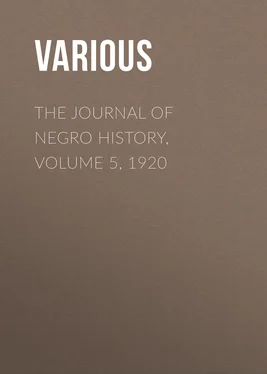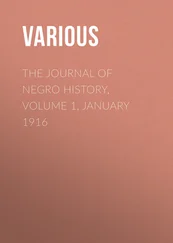Various - The Journal of Negro History, Volume 5, 1920
Здесь есть возможность читать онлайн «Various - The Journal of Negro History, Volume 5, 1920» — ознакомительный отрывок электронной книги совершенно бесплатно, а после прочтения отрывка купить полную версию. В некоторых случаях можно слушать аудио, скачать через торрент в формате fb2 и присутствует краткое содержание. Жанр: foreign_antique, periodic, История, foreign_edu, на английском языке. Описание произведения, (предисловие) а так же отзывы посетителей доступны на портале библиотеки ЛибКат.
- Название:The Journal of Negro History, Volume 5, 1920
- Автор:
- Жанр:
- Год:неизвестен
- ISBN:нет данных
- Рейтинг книги:4 / 5. Голосов: 1
-
Избранное:Добавить в избранное
- Отзывы:
-
Ваша оценка:
- 80
- 1
- 2
- 3
- 4
- 5
The Journal of Negro History, Volume 5, 1920: краткое содержание, описание и аннотация
Предлагаем к чтению аннотацию, описание, краткое содержание или предисловие (зависит от того, что написал сам автор книги «The Journal of Negro History, Volume 5, 1920»). Если вы не нашли необходимую информацию о книге — напишите в комментариях, мы постараемся отыскать её.
The Journal of Negro History, Volume 5, 1920 — читать онлайн ознакомительный отрывок
Ниже представлен текст книги, разбитый по страницам. Система сохранения места последней прочитанной страницы, позволяет с удобством читать онлайн бесплатно книгу «The Journal of Negro History, Volume 5, 1920», без необходимости каждый раз заново искать на чём Вы остановились. Поставьте закладку, и сможете в любой момент перейти на страницу, на которой закончили чтение.
Интервал:
Закладка:
Finally, by a species of corrupt and criminal practices which made those of the Warmoth régime pale into the utmost insignificance, the tide was turned. Another party came into power and the lily-white government was established. Out of such conditions as Miss Lonn has depicted the government of all the Southern States sprang. This book helps us to understand, in some slight degree, the curious political bias of these States. It is in part a heritage of unreasoning fear—not so much of Negro domination as of again being overwhelmed by a flood of corruption let loose by their own kind. How this fear has expressed itself in more recent times we all know too well.
Miss Lonn closes her book with this fitting paragraph: "And therewith the curtain fell upon the last act in this long and weary drama. One can hardly help feeling that surely if Louisiana had sinned, she had paid the penalty of her sins in full measure of atonement."
R. T. BrowneNOTES
Recently there passed from this life Sir T. F. Victor Buxton, Bart., a man attracted to Africa, no doubt, by the record of his distinguished great grandfather T. F. Buxton, Bart., who belonged to that group of English reformers instrumental in giving the death blow to the African slave trade. Early interested in the natives of Africa, the grandson soon became associated with the Church missionary movement. He was largely concerned in the establishment of two corporations, the Uganda Company and the East African Industries, both intended to benefit the natives.
Closely connected with Africa, he often visited various parts with a view to studying the many problems arising in the commercial, social and political world. On these occasions many Africans were entertained by him and he maintained friendly relations with them so as to bring together the representatives of various interests to work for the good of all. His interest in the African natives is further shown by his service as president of the Anti-Slavery and Aborigines Protection Society and as a firm supporter of the Native Races and Liquor Traffic Committee.
Owing to the printers' strike the publication of Dr. C.G. Woodson's illustrated textbook, The Negro in our History , has been delayed. It is highly probable that the volume will appear before spring.
The Journal of Negro History
Vol. V—April, 1920—No. 2
THE DEVELOPMENT OF THE NEGRO PUBLIC SCHOOL SYSTEM IN MISSOURI 178
On Tuesday, the eleventh day of January, 1865, the Negro of Missouri awoke a slave; that night he retired a free man. 179His darkest hour had passed but before him loomed a great task, that of living up to the requirements of a man. His emancipators were confronted with the responsibility of preparing him for his new duties and for the proper use of suffrage which was to be granted him a few years later.
Prior to 1865 the State had seen fit to prohibit the education 180of the slave because, although the educated slave was the more efficient, yet he was the more dangerous; as his training might aid him to make a better revolt against his position. But the qualities which were objectionable in the slave were necessary to the freed man, if he was to prove other than a menace to the State. His emancipators faced the education of the Negro fairly, and the same convention which had passed the Emancipation Act of 1865, drew up a new State constitution which was ratified the same year. This constitution 181provided for the establishment and the maintenance of free public schools for the instruction of all persons in the State who were between the ages of five and twenty-one. It further provided that all funds for the support of the public schools should be appropriated in proportion to the number of children without regard to color.
The legislature, which met the same year, passed a law 182which required that the township boards of education, and those in charge of the educational affairs in the cities and the incorporated villages of the State should establish and maintain one or more separate schools for the colored children of school age within their respective jurisdictions, provided the number of such children should exceed twenty. Persons over twenty-one were to be admitted to these schools. The same officers who were in charge of the educational interests of the white schools were to control the Negro schools. The length of the term and the other advantages to be enjoyed by these schools were to be the same as those enjoyed by the white schools of the same grade. This law further provided that if the average attendance for any month should drop below twelve the school might be closed for a period not to exceed six months. In districts where there were less than twenty Negro children, the money raised for their education was to be reserved by the boards of education in those districts and to be appropriated as the boards saw fit for the education of the Negro children upon whom the money had been raised. The same legislature 183passed an act authorizing towns, cities, and villages to organize for school purposes with special privileges. This act, however, provided that any town, city or village so incorporated should be required to establish one or more Negro schools according to the law. At this session of the legislature 184there was enacted a law to compel the school authorities in each sub-district to prepare a school census of their respective jurisdictions which should enumerate separately and according to sex the white and the Negro children who were permanently resident within the sub-district. In case the directors failed to perform this duty the township clerk was to have the census taken and to recover from the directors by judicial proceedings the cost of the work.
If we were to judge from the constitutional and the statutory laws of this period, we might conclude that the education of the Negro was very popular and that his needs were well taken care of. But before we can draw any conclusion we must study certain conditions. We must know something of the character of the men who were to enforce the law, of the desire of the Negroes for an education, of popular opinion concerning public education, and of the distribution of the Negro population.
The State Superintendents of this period were well trained men, 185and their reports show that they were faithful in the discharge of their duty. One of these superintendents, John Monteith, 186showed great zeal in the establishment and development of the Negro school system. He was born in the Western Reserve district of Ohio, a section noted for its strong anti-slavery sentiment. He belonged to a family of educators. His father was one of the first presidents of the University of Michigan. Monteith completed his education at Yale and served for a number of years as a minister in St. Louis. Upon becoming State Superintendent, he wrote in favor of Negro education a pamphlet which he sent to each of the county superintendents. His annual reports, 187to which we shall refer later, show the interest and the effort which this man put forth to develop the Negro schools of the State.
The Negroes were not indifferent to the efforts which were put forth in their behalf. There is much evidence to show that they took an active part in the establishment 188and the maintenance of schools for their children. In those districts in which Negro schools were maintained and an honest effort was made to better the conditions of the Negroes, they responded heartily to their opportunities. The following quotations are typical of the reports which the superintendents in those counties were able to make in 1874: "In most of the townships a commendable interest is manifested in the support of Negro schools, which I am happy to report, is appreciated by the Negroes 189themselves. The schools have been well attended with considerable diligence manifested by the pupils." A.A. Neal, Superintendent of Pettis County, reported: 190"The Negro schools are doing better than could be expected under existing circumstances." The Superintendent of Bay County said: 191"The Negro schools have been well attended. The pupils have manifested great enthusiasm, and have made surprising advancement in the rudiments." The Journal of Education 192which was printed in St. Louis, by J.B. Merwin in 1869, states: "It is a well known fact that our Negro population manifests the greatest zeal in taking advantage of every opportunity for acquiring education."
Читать дальшеИнтервал:
Закладка:
Похожие книги на «The Journal of Negro History, Volume 5, 1920»
Представляем Вашему вниманию похожие книги на «The Journal of Negro History, Volume 5, 1920» списком для выбора. Мы отобрали схожую по названию и смыслу литературу в надежде предоставить читателям больше вариантов отыскать новые, интересные, ещё непрочитанные произведения.
Обсуждение, отзывы о книге «The Journal of Negro History, Volume 5, 1920» и просто собственные мнения читателей. Оставьте ваши комментарии, напишите, что Вы думаете о произведении, его смысле или главных героях. Укажите что конкретно понравилось, а что нет, и почему Вы так считаете.












